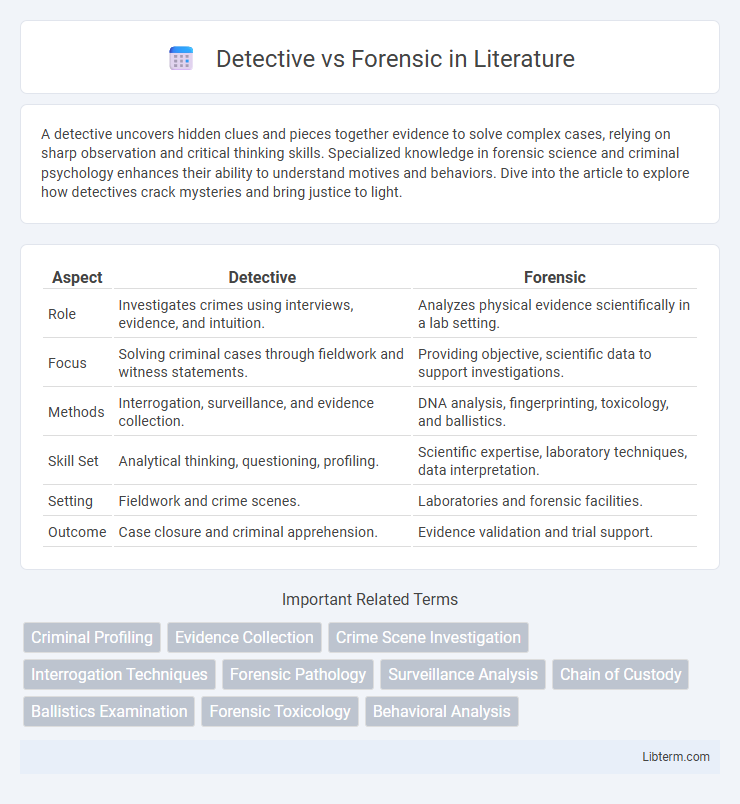A detective uncovers hidden clues and pieces together evidence to solve complex cases, relying on sharp observation and critical thinking skills. Specialized knowledge in forensic science and criminal psychology enhances their ability to understand motives and behaviors. Dive into the article to explore how detectives crack mysteries and bring justice to light.
Table of Comparison
| Aspect | Detective | Forensic |
|---|---|---|
| Role | Investigates crimes using interviews, evidence, and intuition. | Analyzes physical evidence scientifically in a lab setting. |
| Focus | Solving criminal cases through fieldwork and witness statements. | Providing objective, scientific data to support investigations. |
| Methods | Interrogation, surveillance, and evidence collection. | DNA analysis, fingerprinting, toxicology, and ballistics. |
| Skill Set | Analytical thinking, questioning, profiling. | Scientific expertise, laboratory techniques, data interpretation. |
| Setting | Fieldwork and crime scenes. | Laboratories and forensic facilities. |
| Outcome | Case closure and criminal apprehension. | Evidence validation and trial support. |
Introduction to Detective and Forensic Roles
Detectives specialize in investigating crimes through interviews, surveillance, and evidence collection, focusing on solving cases and identifying suspects. Forensic professionals analyze physical evidence scientifically, using techniques like DNA analysis, fingerprinting, and toxicology to support investigations. Both roles collaborate closely, with detectives relying on forensic findings to build strong cases and ensure accurate criminal justice outcomes.
Defining a Detective: Key Responsibilities
A detective is a law enforcement officer specializing in investigating crimes, gathering evidence, and interviewing witnesses to solve cases. Key responsibilities include conducting surveillance, analyzing crime scenes, and collaborating with forensic experts to build a solid case for prosecution. Detectives play a crucial role in identifying suspects, securing arrests, and ensuring justice through thorough investigation.
Forensic Experts: Scope of Work
Forensic experts specialize in collecting, analyzing, and interpreting physical evidence from crime scenes using scientific methods such as DNA analysis, fingerprint examination, and toxicology reports. Their scope of work extends to presenting evidence in court, ensuring the scientific validity and accuracy of findings to support criminal investigations. Collaborating closely with detectives, forensic professionals provide critical insights that help reconstruct events and identify suspects.
Educational Pathways: Detective vs Forensic Specialist
Detectives typically pursue a degree in criminal justice or law enforcement, often supplemented by police academy training and field experience to develop investigative skills. Forensic specialists usually obtain degrees in forensic science, biology, chemistry, or related natural sciences, emphasizing laboratory techniques and evidence analysis. Both career paths require continuous education and certification to stay updated on evolving technologies and methodologies in crime solving.
Skill Sets Required in Detective Work
Detective work demands strong analytical skills, critical thinking, and the ability to conduct thorough interviews and interrogations. Proficiency in gathering evidence, understanding criminal behavior, and maintaining meticulous case documentation are essential. Unlike forensic experts who analyze physical evidence in labs, detectives require advanced investigative techniques and keen observational skills to solve complex crimes.
Forensic Science Techniques and Tools
Forensic science techniques and tools play a crucial role in crime investigation by enabling the analysis of physical evidence, such as DNA profiling, fingerprint analysis, and chromatography. Advanced technologies like digital forensics, ballistics, and toxicology provide precise data that support legal proceedings. These scientific methods complement detective work by offering objective, empirical insights that help establish facts and identify suspects.
Crime Scene Investigation: Collaboration or Separation?
Detective and forensic roles in crime scene investigation often intertwine, with detectives gathering initial evidence and witnesses while forensic experts analyze physical evidence through scientific methods. Effective crime scene investigation requires collaboration to ensure accurate evidence collection, preservation, and interpretation, ultimately strengthening case outcomes. Distinct yet complementary functions highlight the necessity of coordinated efforts rather than complete separation in solving crimes.
Real-World Case Studies: Detective and Forensic Interplay
Real-world case studies highlight the critical interplay between detectives and forensic experts in solving complex crimes. Detectives gather initial evidence and witness testimonies, while forensic specialists analyze physical evidence such as DNA, fingerprints, and ballistic reports to provide scientific insights. This collaboration enhances investigative accuracy, exemplified by cases like the Golden State Killer, where forensic genealogy combined with detective work led to a breakthrough arrest.
Career Prospects in Investigation and Forensics
Career prospects in investigation and forensics vary significantly between detectives and forensic specialists. Detectives primarily advance through law enforcement agencies, focusing on criminal case analysis, interrogation, and evidence gathering, with opportunities for specialization in homicide, cybercrime, or narcotics. Forensic professionals, including forensic scientists and analysts, pursue careers in crime labs and medical examiner offices, specializing in DNA analysis, toxicology, or digital forensics, often requiring advanced degrees and certification for career growth.
Choosing the Right Path: Detective or Forensic Expert
Choosing the right path between becoming a detective or a forensic expert depends on your interest in hands-on investigation versus scientific analysis. Detectives focus on gathering evidence, interviewing witnesses, and solving crimes through fieldwork, while forensic experts analyze physical evidence in laboratories to support criminal cases. Understanding the balance between investigative instincts and technical expertise helps tailor your career to your strengths and goals in the criminal justice field.
Detective Infographic

 libterm.com
libterm.com